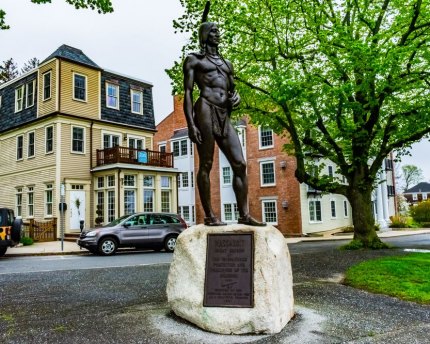
Massasoit is remembered with this Plymouth, Mass., memorial.
Stock photo.
He was called Massasoit (1590-1661), also known as Ousamequin. He was chief of the Wampanoag Indians, who inhabited regions of what later became the states of Massachusetts and Rhode Island.
The chief came from an area near present-day Bristol, Rhode Island, and is known for keeping the peace with the Pilgrims. He had a good incentive for doing so. A plague from 1615 to 1619 had taken the lives of many of the Wampanoag, and another tribe, the Narraganset, tried to subjugate the surviving members.
The Pilgrims arrived in 1620, and Massasoit concluded that they could be a powerful ally, recounts the U.S. Library of Congress. One of Massasoit’s men, Squanto, had been taken as a slave by an Englishman, lived for a short time in England and knew enough English to serve as a translator. Squanto also taught the Pilgrims how to grow Indian corn, according to the Plimoth Plantation website
Massasoit and the English formed an agreement not to hurt one another. When they met, it would be without weapons.
This treaty is credited with the helping the Pilgrims survive. In the fall of 1621, the colonists marked their first harvest with a three-day celebration, regarded as the first Thanksgiving. "Massasoit and 90 of his men joined the English for feasting and entertainment," says the Plimoth Plantation website.
Two years later, Massasoit became ill and the pilgrims nursed him back to health. He lived another 40 years and kept the peace. But after he died, waves of arriving Europeans brought tension. Eventually, there was war, led by Massasoit's second son, according to Encyclopedia Britannica.
The chief came from an area near present-day Bristol, Rhode Island, and is known for keeping the peace with the Pilgrims. He had a good incentive for doing so. A plague from 1615 to 1619 had taken the lives of many of the Wampanoag, and another tribe, the Narraganset, tried to subjugate the surviving members.
The Pilgrims arrived in 1620, and Massasoit concluded that they could be a powerful ally, recounts the U.S. Library of Congress. One of Massasoit’s men, Squanto, had been taken as a slave by an Englishman, lived for a short time in England and knew enough English to serve as a translator. Squanto also taught the Pilgrims how to grow Indian corn, according to the Plimoth Plantation website
Massasoit and the English formed an agreement not to hurt one another. When they met, it would be without weapons.
This treaty is credited with the helping the Pilgrims survive. In the fall of 1621, the colonists marked their first harvest with a three-day celebration, regarded as the first Thanksgiving. "Massasoit and 90 of his men joined the English for feasting and entertainment," says the Plimoth Plantation website.
Two years later, Massasoit became ill and the pilgrims nursed him back to health. He lived another 40 years and kept the peace. But after he died, waves of arriving Europeans brought tension. Eventually, there was war, led by Massasoit's second son, according to Encyclopedia Britannica.
Resources:
- Encyclopedia Britannica: Massasoit.
- National Center for Biotechnology Information: New Hypothesis for Cause of Epidemic among Native Americans, New England, 1616–1619, by John S. Marr and John T. Cathey, first published in 2010 in the journal, Emerging Infectious Diseases.
- Plimoth Plantation -- Plimoth.org: Wampanoag Homesite.
- Plimoth Plantation -- Plimoth.org: Who were the Pilgrims?
- U.S. Library of Congress: The Treaty That Saved Plymouth Colony
Related:
Thanksgiving: Why Pilgrims get bragging rights
Like us on Facebook and tell us what you think.